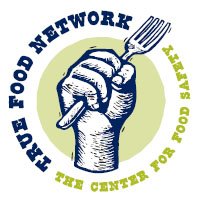 Dairies, Food Companies and Consumers Gather at the Capitol to Say No to Milk and Meat from Animal Clones
Dairies, Food Companies and Consumers Gather at the Capitol to Say No to Milk and Meat from Animal ClonesThe Center for Food Safety today joined with Ben & Jerry’s and dozens of protesters in opposing the Food and Drug Administration’s (FDA) plan to approve milk and meat from animal clones. Despite widespread scientific concern and unaddressed questions about the safety of food from animal clones and their offspring, FDA announced in late December that it plans to approve cloning for food production later this year. The Center for Food Safety has been leading public opposition to FDA’s plan and has already collected over ten thousand comments for submission to FDA in opposition to cloned food.
 “We are here today to let FDA know that the American people will not accept this food cloning experiment on our children’s milk,” said Joseph Mendelson, Legal Director for the Center for Food Safety (CFS). “The biotech industry can say that these foods are safe until the cows come home, but Americans won’t be fooled by industry propaganda – we demand independent scientific review and long-term studies on this radical new food technology.” Last October, CFS filed a legal petition with the FDA seeking a moratorium on foods produced from cloned animals and establishment of mandatory rules for pre-market food safety and environmental review of cloned foods.
“We are here today to let FDA know that the American people will not accept this food cloning experiment on our children’s milk,” said Joseph Mendelson, Legal Director for the Center for Food Safety (CFS). “The biotech industry can say that these foods are safe until the cows come home, but Americans won’t be fooled by industry propaganda – we demand independent scientific review and long-term studies on this radical new food technology.” Last October, CFS filed a legal petition with the FDA seeking a moratorium on foods produced from cloned animals and establishment of mandatory rules for pre-market food safety and environmental review of cloned foods.In addition to Ben & Jerry’s, major dairies are already rejecting milk from clones. In a January 23 letter to its coop members, California’s largest dairy processor, California Dairies, Inc. stated that it “will not accept milk from cloned cows…effective immediately." Another California dairy, Clover Stornetta announced its ban on milk from clones early in January. Organic dairy companies and advocates have also been clear that they will work to insure that cloning is not permitted under U.S. organic standards.
Congress is also already taking steps to address FDA’s approach on food from clones. Senator Barbara Mikulski (D-MD) has introduced legislation calling for mandatory labeling for all food from animal clones or their offspring, and the Boston Globe reported that Connecticut Congresswoman Rosa DeLauro is considering introducing a similar House bill. In December, seven Senators wrote to Health and Human Services Secretary Mike Leavitt in protest over its plan to approve food from clones. Several states, including California and Massachusetts, have ntroduced or are considering state bills calling for labeling of cloned food.
 The European Union has stated that it will consider food from clones or their offspring as “novel foods” subject to regulatory reviews similar to those that have held up trade in genetically engineered foods. Such EU scrutiny could become burdensome for many food products exported from the U.S. For example, Britain is an important market for U.S. ice cream producers. Major grocery retailers in Britain have already announced that they will boycott meat and dairy products from animal clones or their offspring.
The European Union has stated that it will consider food from clones or their offspring as “novel foods” subject to regulatory reviews similar to those that have held up trade in genetically engineered foods. Such EU scrutiny could become burdensome for many food products exported from the U.S. For example, Britain is an important market for U.S. ice cream producers. Major grocery retailers in Britain have already announced that they will boycott meat and dairy products from animal clones or their offspring.

No comments:
Post a Comment